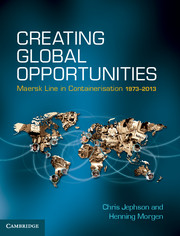Book contents
- Frontmatter
- Dedication
- Contents
- List of figures
- List of tables
- List of Economist Intelligence Unit data
- List of boxes
- Acknowledgements
- Glossary
- Prologue
- 1 ‘Per Aspera Ad Astra’
- 2 The Coming Revolution
- 3 The Decision
- 4 Building the Base (1978–1984)
- 5 Planning the Next Steps (1984–1987)
- 6 Laying the Foundations for Expansion (1987–1990)
- 7 The 1990s
- 8 The Acquisition Trail (1992–1998)
- 9 1999 A Year of Developments and Acquisitions
- 10 Into the New Millennium (2000–2005)
- 11 P&O NedLloyd (2005–2007)
- 12 A New Strategy (2008–2013)
- Epilogue
- Notes and References
- Index
10 - Into the New Millennium (2000–2005)
Published online by Cambridge University Press: 05 April 2014
- Frontmatter
- Dedication
- Contents
- List of figures
- List of tables
- List of Economist Intelligence Unit data
- List of boxes
- Acknowledgements
- Glossary
- Prologue
- 1 ‘Per Aspera Ad Astra’
- 2 The Coming Revolution
- 3 The Decision
- 4 Building the Base (1978–1984)
- 5 Planning the Next Steps (1984–1987)
- 6 Laying the Foundations for Expansion (1987–1990)
- 7 The 1990s
- 8 The Acquisition Trail (1992–1998)
- 9 1999 A Year of Developments and Acquisitions
- 10 Into the New Millennium (2000–2005)
- 11 P&O NedLloyd (2005–2007)
- 12 A New Strategy (2008–2013)
- Epilogue
- Notes and References
- Index
Summary
Other companies, such as Hutchison and Sea-Land Services, probably saw this a little bit earlier than the Maersk Group, but the need for highly efficient and quality port infrastructure has become more and more evident. The journey was not a revolution, it was an evolution. It has taken since 2004 to really establish APM Terminals as an independent business with its own portfolio of customers and with its own individual branding.
Kim Fejfer, President of APM TerminalsGetting to Year 2000
As so often, Containerisation International provided a commentary on the sector in its 1997 yearbook. Jane Boyes wrote:
It was unsatisfactory bottom lines and disgruntled shareholders, which pushed P&O and NedLloyd into each other’s arms, rather than a desire to provide shippers with better service. The largest portion of PONL’s yearly cost savings, some USD 130 million, will be made on staff and overheads. The industry wisdom was that the global operating alliances should ultimately produce savings of approximately USD 100 per TEU moved per year. The question which has yet to be answered is, are they delivering this?
One alliance which might have the best chance of realising such economies, is the largest grouping of all, that between Denmark’s Maersk Line and Sea-Land Service, of the USA. According to John Clancey, President and CEO of Sea-Land, each partner is anticipating annualised savings of USD 100 million by 1998.
In the same article, she went on to say that
the problem is not lack of growth in revenues overall, which rise inevitably each year as a function of annual container trade increases in the order of seven per cent to eight per cent, but rather a consistent erosion of per box revenues. There has been a decline of as much as 60 per cent in real terms per unit revenues in certain key East/West trades since the mid-1970s. Collectively, the industry seems to be unable to reverse the debilitating price erosion which has characterised it for so long, hence the emphasis on costs.
- Type
- Chapter
- Information
- Creating Global OpportunitiesMaersk Line in Containerisation 1973–2013, pp. 276 - 310Publisher: Cambridge University PressPrint publication year: 2014



